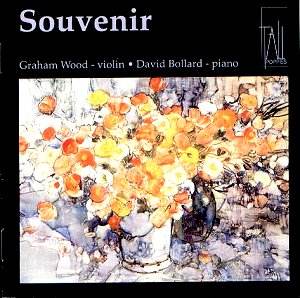Graham Wood and David Bollard have been sonata
and chamber music colleagues for many years and their sympathetic
adaptability is a mark of lasting rapport. Wood is a Grinke student
and is now associate leader of the West Australian Symphony Orchestra
as well as a quartet leader. Bollard, New Zealand born, also studied
in London – amongst others with Kentner and Katchen – and is active
as a concerto soloist and recitalist, and prominently as a member
of the Australia Ensemble. In this programme, mainly selected
by the violinist – ten were actually chosen by him as part of
the Violin syllabus of the Australian Music Examination Board
– we hear an essentially Old School recital, enlivened by the
appearance of a less well known piece or two. The disc’s rationale
is nostalgia and the playing is commendably intimate and suitably
reflective.
Bridge’s very early
Souvenir, the piece that gives the disc its title, has never struck
me as anything much above salon conventionality but Wood and Bollard
are nicely lyric with it. They drive into the Martinů Impromptu
with vigour, mining the skittish dance of the Andante moderato
with acumen - and the motoric niceties of the concluding Allegretto
moderato are equally well negotiated. I like the way they catch
the drama and sweep of Dvořák’s Ballade and especially the
heavy conclusive tread, tinged with a
keening introspection that they evoke with such musical delicacy.
If Młynarski’s Mazurka is rather predictable and generic
there’s still plenty of room for snappy rhythms and drive, as
here, and the duo embark on some Polish animation equally in the
Wieniawski offerings. Wood reserves greatest variation
and depth of vibrato for the first of Arthur Benjamin’s Five Negro
Spirituals, I’m a-trav’lin to the grave, but I most appreciated
the fourth of the set, the quietly complex I’ll hear the trumpet
sound – excellent colouring and sensitivity from both musicians,
as well, as they explore Benjamin’s little harmonic twists and
turns. They’re delightful in the Reger items – I always associate
these with Busch – and in the opening of the early, little but
far from insignificant Mozart Sonata they manage to catch the
strange wanderings of the lyric line. Wood’s Kreisler could perhaps
do with a touch more idiomatic rhythm and tonal resource but it’s
a pleasing touch to end with the underplayed Syncopation.
A most enjoyable recital then; nothing grandiose
about the works or the conception but instead plenty of sympathetic
give and take and a fine reflection of the two musicians’ abilities.
Jonathan Woolf

